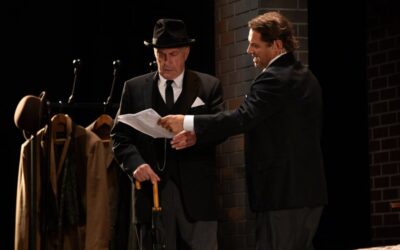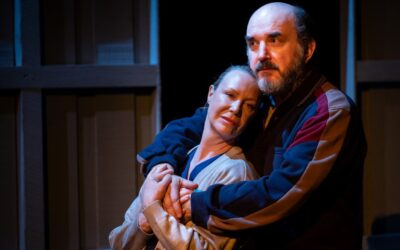By Chenoah Eljan
Walking into the theatre Avril Lavigne’s “My Happy Ending” plays, welcoming the audience to 2004 but also alluding quite adroitly to what is about to unfold. Olivia (Helen Doig) sits on stage, muttering along to a television. Four unique spaces of a working-class home are compacted into the small stage, a clever visual representation of the claustrophobic intimacy that is family.
The home belongs to the family’s matriarch, grandmom, who is bedridden, unconscious, and nearing death (but nonetheless played by Lyndal Charteris). Her family arrives in the home to say their final goodbyes. Many have not spoken to each other for years. As the story unfolds, we come to learn why. Petty jealousies, stern grudges, and dark family secrets come to the surface as the family grapples less with grandmom’s imminent death than with their continued presence in each other’s lives.
It is a big cast for a little stage. As the title suggests, there are seven women in this story, prisoners of their circumstances. Doig’s Olivia is the matriarch-apparent; she escapes from her circumstances through distraction and denial. Her estranged daughter Frankie (Mikaela Ebony) makes plain she is there for grandmom, not for forgiveness. Olivia’s sisters Gabrielle (Bronwen Coleman) and Barbara (Clare Larman) have their own families, heartaches, and horrors. Barbara brings along her daughter Joanne (Pia Omeadhra), who is loathed in equal measure by the older generation for being a lesbian and by the younger generation for being an inconsistent dog sitter. The final two women of the seven are grandmom herself, silent in dying – much as we discover she was in life – and married neighbour Maureen (Ani Priyo), whose purpose appears to be simply to remind us that women can be as cruel to women as men are.
In addition to the seven women, three men round out the cast. Chris (Max Garcia Underwood), Olivia’s imperfectly adulting son; Enzo (Sebastian Gunner), Olivia’s Italian husband; and an imaging or hallucination of Bob (Tim Clarke), Gabrielle’s bagel shop owning and soon-to-be-incarcerated husband. With the exception of Chris, who is both the most sympathetic character and the most well delivered, the men in this play are caricatures. In particular, Enzo’s under-developed motivation and slapstick physicality grate and undermine the powerful role he plays in these women’s lives.
The best moments of this play are the looks shared between the family members which vividly illustrate alliances, compassion, and love, although this family would never call it that. In particular, the younger generation sharing glances in one room when overhearing conversation in the next, and the three sisters silently eating out of a shared Tupperware of leftovers late in the night. The most honest and searing depiction of any relationship in this play – and, perhaps not coincidentally, the happiest one – is the sibling relationship between Chris and Frankie. This is a credit not just to the actors and the playwright Andrea Ciannavei, but also undoubtedly to director Cathy Hunt who allows the actors to share physical space in a way that is unique to siblings.
This is a play about how cycles of abuse repeat themselves. It is an important topic which warrants our attention and consideration, but it is also a pretty grim one. Ciannavei shows us youthful hopefulness and optimism that one can escape one’s captors, only to remind us that escape rafts can be captors themselves. Secrecy and denial are permissions granted to abusers, but 7 Captiva Road does not foster much hope that shining a light and facing up to reality will necessarily break the cycle. This play has a brilliant and unique ending, but a deeply sad one as it reminds us that every bad ending started with a hopeful beginning.
This is an American play. But it could be Australian. This is not a uniquely American story. It is therefore regrettable that, as so many do, the choice was made to have these actors attempt American accents. The accents add nothing, but at times detract heavily. What inferiority complex drives us to insist on American accents for American plays continues to bemuse and frustrate. Allowing these actors to focus entirely on what they were saying, not how they were saying it, would have elevated this play significantly.
Image: Parenthesy – Cameron Grant





